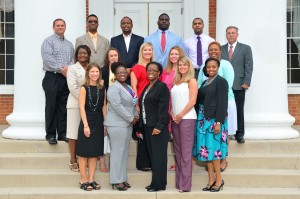
The first cohort of UM’s hybrid doctorate in K-12 leadership has a combined 199 years experience in education.
OXFORD, Miss. – The first class of the University of Mississippi’s hybrid Doctor of Education program in K-12 leadership gathered on campus recently to begin the three-year process of earning professional education doctorates. Most of their learning sessions, though, will be in various locations across north Mississippi
Unlike traditional doctoral programs, UM’s hybrid Ed.D. utilizes both online courses and face-to-face seminars on weekends. As working professionals, participants can immediately use what they learn to benefit their school districts.
“The most attractive aspect of the program is that we are going to have the chance to see what research and theory look like in practice,” said Jamone Edwards, assistant superintendent of the North Panola School District and one of the initial cohort’s members. “For me, I hope to bring innovation and strategy back to the North Panola School District.”
The Ole Miss program integrates the dissertation into the curriculum, an approach used by only a few elite universities, including Harvard and Vanderbilt. The program is designed to be specialized, but challenging and success-driven, said Doug Davis, associate professor and director of doctoral programs in educational leadership at the UM School of Education.
“We have extremely high expectations for this first cohort and that’s nothing but a good thing,” Davis said. “The focus of this program is to learn the knowledge base that comes from research and theory and enable practitioners to successful apply it to achieve results in their districts.”
The group of 16 hails from school districts across the northern half of Mississippi and southwest Tennessee. They have more than 199 years combined experience in K-12 education.
The group also includes Regina Biggers, principal of Kosciusko Middle Elementary School; Bobby J. Cossey Jr., assistant principal of Rankin Elementary School in Tupelo; Angela Ellison, principal of Como Elementary School; Valarie Ellis-Barnes, principal of North Panola Middle School; Ashley Fonte, curriculum coordinator of the South Panola School District; Cloyd Garth, principal of Aberdeen High School; Chandler Gray, curriculum coordinator for professional development for the Corinth School District; Vanessa Hopkins, instructional literacy coach for Shelby County Schools in Memphis, Tennessee; Mark Jean-Louis, assistant principal of Shivers Middle School in Aberdeen; Talina Knight, assistant principal of Tupelo Middle School; Cindy Risher, assistant principal of Horn Lake Intermediate School; LaTonya Robinson, principal of Della Davidson Elementary School in Oxford; Thomas Tillman, principal of Lafayette Upper Elementary School in Oxford; Deatrice White, assistant superintendent and federal programs director of the Coffeeville School District; and Haley Wilson, assistant principal of Lafayette Elementary School in Oxford.
The new program was developed because of an ongoing collaboration with the Carnegie Project on the Education Doctorate, a consortium of more than 80 institutions undertaking an examination of professional doctorates in education.
While the first classes of the semester take place on the Oxford campus, the cohort will travel to their fellow participants’ school districts and hold class roughly once a month. This will allow, for example, an assistant principal at Lafayette Middle School to get immersed in public education environments in the Delta or Aberdeen or Shelby County Schools.
“The hybrid Ed.D program provides the opportunity to continue my assistant principalship while embedding new knowledge and reflection into my professional practice,” said Wilson, a Batesville native. “From my experience, the cohort model also provides the support necessary to create a group of professional educators who maintain a learning community for years to come.”
The hybrid Ed.D. is rooted in problem-based learning and will enable these education leaders to identify goals within their own school districts and incorporate these goals into their doctoral studies.
“When you are dealing with a problem, it has to be broken down before you can solve it,” said Dennis Bunch, UM associate professor and coordinator of educational leadership. “That’s the valuable part of going through this process as a cohort. Change can be uncomfortable and cohort members get to go through that together and learn how to accomplish their goals as a group.”
The new doctoral program also rethinks the traditional dissertation by requiring doctoral students to complete a “Dissertation in Practice,” which is a major research project focused on solving a real-world problem in Mississippi education. The dissertation will be integrated into the curriculum of the Ed.D. Students will have completed prospectuses (typically the first three chapters of a dissertation) by the end of the second year of study.